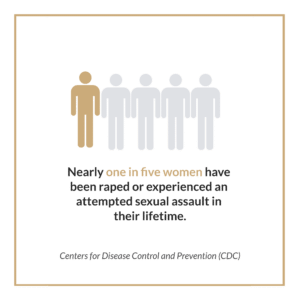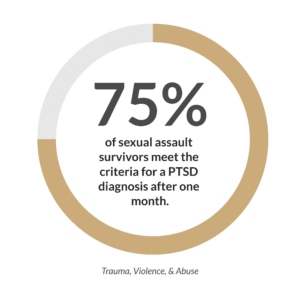How Trauma From Sexual Assault Affects Emotional and Mental Health
April 15, 2024
 It’s shocking just how common sexual violence is. In the United States alone, nearly one in five women have been raped or experienced an attempted sexual assault in their lifetime, according to the Centers for Disease Control and Prevention (CDC). Oftentimes, it’s by someone they know and even trust.
It’s shocking just how common sexual violence is. In the United States alone, nearly one in five women have been raped or experienced an attempted sexual assault in their lifetime, according to the Centers for Disease Control and Prevention (CDC). Oftentimes, it’s by someone they know and even trust.
And for many women, it’s happening well before their 18th birthday. For one in three females who’ve been raped, the first instance occurred between ages 11-17, according to the CDC. Another staggering one in eight reported sexual assault, attempted sexual assault, or rape before age 10.
Not surprisingly, trauma from sexual assault is common too, and it extends far beyond the physical injuries. How it plays out may look a little different for everyone, but sexual assault aftermath can include:
- Feeling alone, ashamed, or scared
- Flashbacks or recurring nightmares
- A lack of trust in others or even yourself
- Questioning of your judgment and what “you did wrong”
- Fear of intimacy in relationships or fear of relationships altogether
- Struggles with post-traumatic stress disorder (PTSD)
- Loss of self-worth
- Anxiety or depression
- Increased risk of developing substance abuse to ease distress
- Increased vulnerability to suicidal ideation or attempted suicide
Trauma from sexual assault is common too, and it extends far beyond the physical injuries.
Each of our individual responses to trauma is unique and varies based on our life experiences. But what the aforementioned effects have in common is their ability to disrupt our mental health and hinder us from living a healthy, happy, and stable life. After you or your loved one has taken the steps to manage the immediate and short-term needs following a sexual assault, life can still be unsettling. The Mayo Clinic Press reports, “Many people continue to struggle with the lingering effects of sexual abuse or assault for months or years.”
Prioritizing Trauma Resolution
When it comes to addressing the aftereffects of sexual violence, it’s probably tempting for some to buy into the adage that “time heals all wounds.”
While time may provide some physical distance from the event, it can’t be overstated how important it is not to overlook the effect that trauma has on your emotional and mental health. “The trauma of sexual violence is not something we fix,” says photographer Kate Ryan in The New York Times. “It is something we manage daily. It takes work. And that work is as messy and complicated as the individuals who live it.”
Recovering from rape or sexual trauma isn’t something meant to be managed alone. As difficult, embarrassing, or impossible as it seems, it’s far more dangerous mentally and emotionally to keep it to yourself. There’s power, not to mention healing, in reaching out to treatment professionals for therapy and support.
In addition to a strong support system, it’s important to have a plan for triggers that may arise unexpectedly. Triggers could include driving by a place associated with your assault, the anniversary of when events happened, seeing someone who resembles the person who harmed you, etc.
Learning about your triggers, how to process them, and developing coping strategies after sexual assault will help you realize what’s happening in real-time so you can take the steps to calm down, reset, and realize you’re not in danger.
Sexual Trauma’s Impact on Emotional Well-Being
The emotional impact of sexual trauma cannot be understated. Feelings like shame, guilt, and self-blame are quick to set in. These not only disrupt your emotional well-being but can also keep you from speaking up, either immediately after or as you struggle alone with long-term effects and feelings. And the impact on emotional well-being can also indicate bigger disruptions to underlying mental health.
In addition to, or instead of, these feelings of guilt and blame, you may find you sometimes don’t feel anything at all, or you feel disconnected from yourself and the world around you. Dissociation can be a response to both one-time and ongoing sexual trauma and is especially common as a lingering effect of childhood sexual trauma. When you dissociate, you feel like you are in a fog or in a dream. You may feel like you are watching yourself from a distance. Your body may feel heavy, cold, or slow.
Dissociation can happen at any time, but when we’re talking about sexual assault survivor mental health, you may experience it most frequently or regularly during sex. Psychological Medicine shares that sexual assault can also impact future sexual health by leaving you with hyperarousal or depressed sexual interest. You may disconnect from the situation or even experience amnesia, or you may be hypervigilant and react physically or with anger to sexual situations, says Mayo Clinic. Any of the emotional effects of coping with sexual assault trauma can make for difficulty with intimacy and healthy relationships.
Mental Health Effects of Sexual Trauma

Emotional health is important in and of itself. But emotional troubles can also indicate, or stem from, even larger concerns. Issues like post-traumatic stress disorder (PTSD) after sexual assault are common. Depression and anxiety are even more so.
Trauma, Violence, & Abuse reveals that 75% of sexual assault survivors meet the criteria for a PTSD diagnosis after one month. After one year, 42% still meet the criteria. Furthermore, most PTSD recovery occurs during the first three months, with recovery slowing or no longer progressing after this point. This is why mental health support for sexual assault survivors is so important, both as soon as possible after the event and even years later. You can resume your progress towards healing from rape and sexual assault at any time with the right professional care.
Even if PTSD is not present, mental health effects of sexual assault like depression and anxiety can deeply disrupt your life, and both are much more common among sexual assault survivors than the general population.
Another concern that may not come to mind as one of the long-term effects of sexual trauma but absolutely is, is substance abuse. It is not unusual for sexual assault survivors to self-medicate distress directly related to the event(s) or in response to their PTSD, depression, or other mental health symptoms. However, drugs and alcohol only complicate a life already reeling from the sexual assault aftermath.
How Sexual Trauma Affects Men
While the scales are still tipped heavily toward women, nearly 1 in 38 men have also experienced rape, sexual assault, or an attempted sexual assault during their lifetime.
According to the CDC, one of every four male victims of rape is between the ages of 11 and 17 when first assaulted. Another one in four males have reported being raped before age 10. As with women, there is shame associated with sexual abuse, which often makes men reluctant to talk about it. Society’s toxic masculinity mindset also negatively reinforces the idea that “real” men must be self-sufficient, tough, and strong.
As a result of unresolved trauma, men may struggle with seething anger, particularly when feeling threatened or betrayed. Psychological effects of sexual assault like low self-esteem, the inability to be vulnerable in a relationship, and lack of sex drive have also been reported, which can interfere with their perceived “manhood.” Sexual abuse has also led many men to question their sexual orientation or have concerns about their masculinity.
The Washington Post also noted that LGBTQ men are at a greater risk for sexual trauma than heterosexual men. More than 40% of gay men and 47% who identify as bisexual reported being sexually victimized, compared with 21% of heterosexual men.
While it’s certainly not easy and may challenge our culture’s perception of male gender roles, opening up and becoming vulnerable about what has happened is key in processing sexual trauma in healthier ways.
Hope and Healing From Sexual Trauma
If you or someone in your life is struggling in the aftermath of sexual abuse and any co-occurring disorders, don’t hesitate to reach out to our caring, knowledgeable staff at Willow House for Women. For nearly 50 years, our treatment professionals have been offering trauma recovery for survivors. We can help you overcome addiction, heal unresolved emotional trauma, and develop the tools needed to transform your life, too. Reach out today to take the first step.
